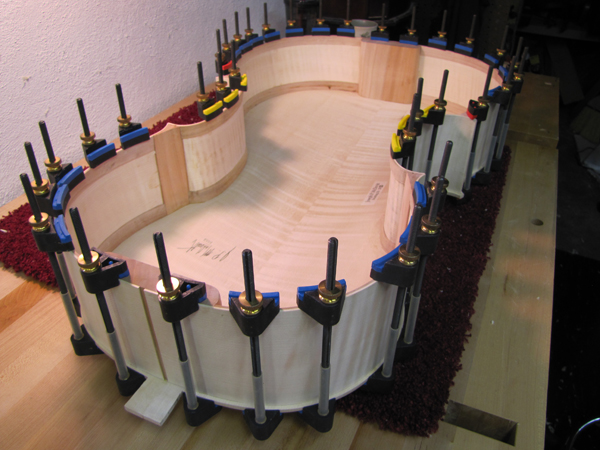Cello Maker in Philadelphia
As a cello maker in Philadelphia, Joseph P. McDevitt, master luthier and owner of Fegley Instruments & Bows, loves being at his workbench. He appreciates that one of the most satisfying experiences for a musician is finding an expertly handcrafted cello that suits one perfectly, and he prides himself on his ability to transform raw materials into the finest quality stringed instruments and bows.
Most musicians agree that an instrument crafted by a master violin maker is better than a mass-produced one. Joe was traditionally trained at the prestigious North Bennet Street School in Boston, and worked closely with both Marco Coppiardi, a master violin maker from Cremona, Italy, and Hans J. Nebel, a world-renowned violin restorer.

Wood Selection
One of the most important decisions has to make when building a cello is the wood he will use, because it will determine the instrument’s tonal and playing characteristics. It’s important to pick just the right piece for the task. Wood for violin, viola, and cello tops is always spruce, and is nearly always two matched pieces with a glue joint down the center. Aside from being symmetrical, the very straight, tight grain makes it strong and stable.
The back, sides, neck and scroll of the cello are crafted from maple which has different grain patterns – flamed, birds-eye, straight grained – that affect the instrument’s sound and appearance. The back can be a two-piece back like the top or a one-piece slab, which produces a deeper, rounder sound. Poplar and willow can also be used, and they usually result in a darker, mellower sound.
Fingerboards, tailpieces and pegs are generally made from ebony, which produces a loud, impressive sound, or rosewood, which results in a mellow, well-rounded sound. A master luthier will have an excellent understanding of how to utilize wood to get the best performance from the instrument.
The Varnishing Process
The varnishing process can also create different outcomes and is a sign of the cello maker’s skill and technique. Heavy varnish can dampen the sound of the instrument. Good varnish is transparent enough to allow the beauty of the spruce and maple wood to come through and soft enough to allow the instrument to vibrate freely when played, enhancing the sound. It also protects the wood from dirt, grease and humidity.
Set up and follow up
Once the pieces have been assembled and glued and the varnish is dry, the set up begins. The parts that go into and on the cello, such as the soundpost, bridge, bass bar, tailpiece and strings, affect the instrument’s voice and feel. With follow-up adjustments as the customer plays, the cello will sound beautiful for many years to come.
Using the finest woods, personally formulated varnishes, and careful attention to detail, Joe handcrafts extraordinary violins, violas and cellos that are sought after for their beauty and tone.
Fegley Instruments & Bows in Reading, PA offers an extensive collection of fine instruments and bows for everyone from professional orchestral musicians, to jazz, rock, country and world music artists, as well as students and amateurs. We also offer setup, soundpost adjustment and bow rehairing. Consider us when you are looking for a cello maker in Philadelphia to handcraft your next great instrument.

